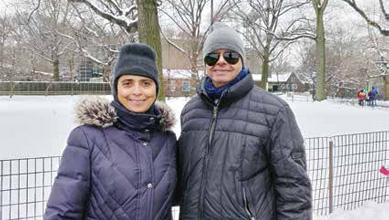Factories of the future will exploit robotics and AI to use three of the five human senses – sight, sound and touch to improve manufacturing output and there are already experiments in progress on the use of smell. How about taste? Not in the near future, one hopes! Let’s keep a few good things for human beings
 Uma and Ganesh Natarajan in snowy Central Park, New York
Uma and Ganesh Natarajan in snowy Central Park, New YorkIf there is one word that has taken the world by storm, it is Digital. Digital technologies Cloud Computing, Mobility, Big Data and of course, Social Media, are pervading every corporation and affecting the way each one of us engage with brands and even with each other. Customer journeys, in retail, insurance, banking, healthcare and education are traversing multiple channels.
In many cases, companies are hard to put to predict whether a buying decision will be taken in their store, in the comfort of an armchair at home while the consumer is browsing the internet or at a bus stop through an impulse decision triggered on a mobile phone. The interesting point to be noted is that it is not just the digital natives – millennial and Generation Z who have been swept away by the digital maelstrom, it is also many of us digital immigrants who have first experimented and then mastered the use of digital devices, who have fueled the revolution and will continue to take it to new levels of adoption.
Some futurists believe that we will have to watch out for a time called the singularity, when the collective capability of various technologies exceeds the intelligence of the human race. But not everybody subscribes to this theory even as new technological advances in artificial intelligence, machine and deep learning, augmented and virtual reality and everything in the world connected through the Internet of Things are creating opportunities for change, which could not have even been envisaged if these technologies did not continue to explore and push the boundaries between imagination and reality.
Paul Daugherty, Chief Technology Officer of global digital leader, Accenture, one of the leading voices of the technology world does not believe we should worry about technology taking over the world. In the post-digital era, when every significant corporation has fully exploited the power of mobility, cloud, social media and analytics, he believes there is an opportunity to move beyond ubiquitous big data which has the ability to take over inferences and decision making to a return to the power of human ingenuity, where inferences will be drawn from small data sets to build insights for the future.
The reason why digital transformation will continue to inspire big investments in the foreseeable future is its potential to change the way large corporation CEOs deliver products and services to the market.
Speaking at the NASSCOM event, Ulrich Spiesshofer, President & CEO of ABB Ltd underlined this when he spoke of the extensive use of AI for autonomous operations and their new factory in Shanghai where robots build a range of robots in a totally flexible manufacturing environment which is almost free of human intervention. Factories of the future will exploit robotics and AI to use three of the five human senses – sight, sound and touch to improve manufacturing output and there are already experiments in progress on the use of smell. How about taste? Not in the near future, one hopes! Let’s keep a few good things for human beings.
Investment in digital is no longer an option, it’s an imperative
In the last week of February, I had the privilege to be a speaker at a technology exchange event in the USA organized by digital innovation leader Fulcrum Inc. Multiple CEOs from insurance, media and education spoke about their usage of block chains and artificial intelligence for continuous and disruptive innovation in their organizations. But it was also heartening to hear the CEO of a multi-billion-dollar organization speak with equal pride about the focus on people and ideas within the organization that he valued even more than the technology prowess his organization demonstrates. The fundamentals should never change with an equal focus on profits, people and planet in the organizations of the future.
At NASSCOM, Paul Polman, CEO of Unilever, exhorted industry leaders to think about solutions for the 850 million people who sleep hungry every night and the eight million who die of air pollution every year and work towards being a trustworthy participant in global development. Go beyond the two per cent CSR mandated by Government and look at helping the planet in the implementation of sustainable development goals, he said.
Thierry Delporte, Cap Gemini Global COO, expressed confidence that judicious use of AI would create new capabilities and also new jobs while Karenann Terrell, Chief Digital Officer of Glaxo Smith Kline predicted that personalization and adaptive technologies would enable customer solutions to move from “One fits all” to “curated by you for you” which will be the real value for every customer of goods and services and in a larger context, for every citizen of the country.
So where am I heading with this essay? Investment in digital is no longer an option, it’s an imperative but in doing so, there is no need to sell one’s soul to technology. Whether you are a corporate leader or just an entrepreneur or intelligent city dweller, its good to take a balanced view of technology and ensure that it augments our work and life and doesn’t threaten to take it over!
By Dr. Ganesh Natarajan